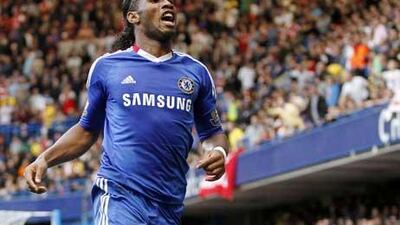Chelsea unveiled a bronze statue of Peter Osgood outside Stamford Bridge ahead of yesterday's showdown against Arsenal.
It is a fitting tribute to the club's legendary centre-forward still hailed as the "King of Chelsea", who passed away four-and-a-half years ago at the age of 59.
Osgood was the fans favourite because he not only scored goals - 150 of them in 380 games - but dazzled with both panache and passion during a golden period for the club in the late 1960s and early 1970s.
In years to come it would not be out of place if a sculpture of Didier Drogba rubbed shoulders alongside Ossie. Yes, John Terry and Frank Lampard are also talismen of this Chelsea side that has become a superpower over the past decade. The English pair will command a place in club's Hall of Fame.
But if the two Londoners are the soul and spirit of Chelsea, then 32-year-old Drogba, of the Ivory Coast but raised in France, is the sword.
Just like Osgood, he is not just a prolific goal scorer but a striker who can run games from the front with a thrilling combination of subtle skill, sweat and stamina. Especially so against Arsenal, who he constantly torments whenever these teams meet. Yesterday was no exception. Drogba scored the decisive first goal with a brilliant instinctive finish then inspired his team to keep Arsenal at bay.
When the midfield and defence see their centre-forward putting himself about, constantly hunting down the ball when he does not have it and holding it up when he does, they are compelled to put themselves about too. Woe betide them if they do not. Indeed, Drogba revealed afterwards that during the first half he had to read the riot act to get his Chelsea teammates into gear after Arsenal had dominated the opening stages.
Frustrated at what he perceived as lethargy in the Chelsea back four, Drogba ran over to the touchline and made his point to manager Carlo Ancelotti. The cameo cajoled Chelsea and just a few minutes later it was high fives all round, rather than shaking fists, as Drogba deftly back heeled Ashley Cole's low cross past a bewildered Lukasz Fabianski, the Arsenal goalkeeper, at the near post. It was an inspired finish and Drogba's 13th goal in 13 appearances in all competitions against the Gunners and his 10th strike in the last seven games.
Despite the advantage Arsenal still had the better of the possession. But, fired by Drogba's intervention and influence, Chelsea battled to victory in a way they had failed to do in defeat at Manchester City last week. In the 85th minute it seemed as though Drogba would torment Arsenal even more when he lined up to lash home a 22-yard free kick. Instead, showing his unselfishness, he stepped aside and allowed centre-half Alex to do the honours.
If Drogba had been leading the Arsenal line then the Gunners would have won this game and by some distance. Indeed, one wonders what might have been if, in 2004, Wenger had won the battle to sign Drogba from Marseille, the French club. Since that season the Gunners have not won a trophy.
In the build up to the game Drogba admitted that he had been close to signing for Arsenal, but in the end Wenger's team could not match what, at the time, seemed an astronomical £24 million (Dh139.2m) fee that Chelsea were prepared to pay for a relative unknown in the early days of Abramovich's revolution.
Jose Mourinho, Chelsea's former manager, has always said that Drogba was the most important signing he ever made for the club and its significant that Chelsea started to win serious silverware after his arrival. The club's first Premier League title came in his first season. There have been occasions when Drogba's emotional on-pitch outbursts have made him a figure of ridicule. But that passion is part and parcel of a chemistry that makes him a winner - and Osgood's heir apparent.

